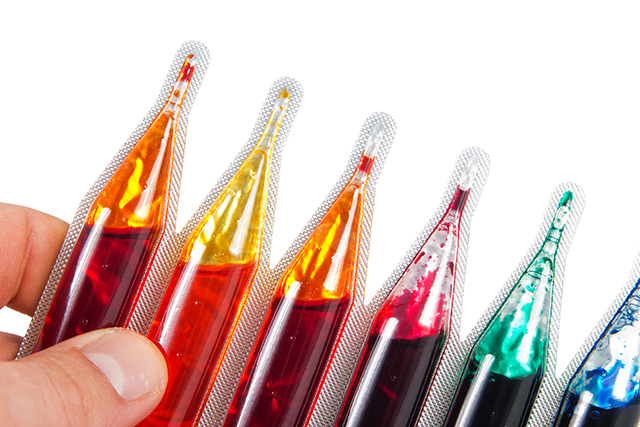 Parler
Parler Gab
Gab
People consume nanoparticles daily, reveals study
Elad Tako, senior author and associate professor of food science at Cornell, warned that people are consuming nanoparticles from food coloring and anti-caking agents on a daily basis. He cautioned that they still don't know how much people consume and there is no definitive data on the long-term effects of this consumption. Through the study, Tako and his colleagues were able to demonstrate some of these effects. Tako added that the study findings could be used to learn more about gastrointestinal health and development. In earlier studies, Binghamton researchers led in vitro cellular assessments and screened different nanoparticles used frequently in food and pharmaceutical industries." The research team then narrowed its focus to specific metal oxide nanoparticles to confirm proper testing dosages that are suitable for human consumption. For the collaborative study, experts from Binghamton and Cornell used human-appropriate doses of titanium dioxide and silicon dioxide in the laboratory's in vivo system. The model helped the researchers monitor the display of a health response comparable to that of real humans, and they injected the nanoparticles into chicken eggs. After the eggs hatched, the scientists observed changes in the functional, structural and microbial markers within their blood, the duodenum or upper intestine, and the cecum or pouch that connects the small and large intestines. Results revealed that titanium dioxide and silicon dioxide, two nanoparticles commonly used in food, "may negatively affect intestinal functionality." Specifically, the nanoparticles have a negative effect on "key digestive and absorptive proteins." (Related: These 3 foods can boost your heart and gut health.)Should products using these ingredients be banned?
The research team also studied zinc oxide, a micronutrient, and iron oxide, an iron fortification supplement, to see how they function. Their findings revealed that zinc oxide nanoparticles help support the intestines and may help them compensate after suffering damage. On the other hand, iron oxide nanoparticles seemed to negatively alter intestinal function and overall health. This means that while iron oxide may serve as a viable option for iron fortification, it is not the best option for maintaining gut integrity. Researchers reported that zinc oxide would be the best choice. While these findings about currently available food-grade nanoparticles aren’t all positive, the research team doesn't think their use should be banned completely without further research to back up that decision. They also recommended that more feasible developments would have to be made to introduce "healthier, more cost-effective and sustainable alternatives."Tips on how to avoid food dyes
Dyes are used in foods to make processed food look more attractive, but they have no nutritional benefit. Protect your gut health by following the tips below to avoid food dyes: Choose organic foods Look for organic foods with the green-and-white United States Department of Agriculture-certified organic label. Remember that some foods labeled "made with organic ingredients" may still contain synthetic dyes. The best way to remove artificial food dyes from your diet is to prepare meals using whole, unprocessed foods that are full of various nutrients. These foods are naturally dye-free:- Dairy and eggs – This includes cheese, cottage cheese, eggs, milk and plain yogurt.
- Fresh fruits and vegetables – All fresh fruits and vegetables are dye-free. Avoid canned fruits in heavy syrup because they contain corn syrup and sugar. For a healthier alternative, look for canned fruit in water.
- Grains – This includes barley, brown rice, oats and quinoa.
- Legumes – Legumes like black beans, chickpeas, kidney beans, lentils and navy beans are dye-free.
- Meat and poultry – Fresh, unmarinated beef, chicken, pork and fish are dye-free.
- Nuts and seeds – When buying nuts, look for unflavored almonds, cashews, macadamia nuts, pecans, sunflower seeds and walnuts.
More related stories:
Here are 4 reasons to include tree nuts in your diet. Natural pigments are a safer alternative to harmful artificial food colorings (AFCs). Study: Toxic rinse aid used in industrial restaurant dishwashers linked to serious health problems. Sources include: StudyFinds.org HuffPost.com Healthline.com TasteOfHome.com Brighteon.comCompounds in Lion’s mane mushroom found to improve memory by aiding nerve growth
By Ramon Tomey // Share
Study finds 95% of school lunches contain glyphosate, other contaminants
By Belle Carter // Share
Plan to INJECT toxic Ohio wastewater underground in Texas alarms locals
By Arsenio Toledo // Share
By Arsenio Toledo // Share
Governments continue to obscure COVID-19 vaccine data amid rising concerns over excess deaths
By patricklewis // Share
Tech giant Microsoft backs EXTINCTION with its support of carbon capture programs
By ramontomeydw // Share
Germany to resume arms exports to Israel despite repeated ceasefire violations
By isabelle // Share










